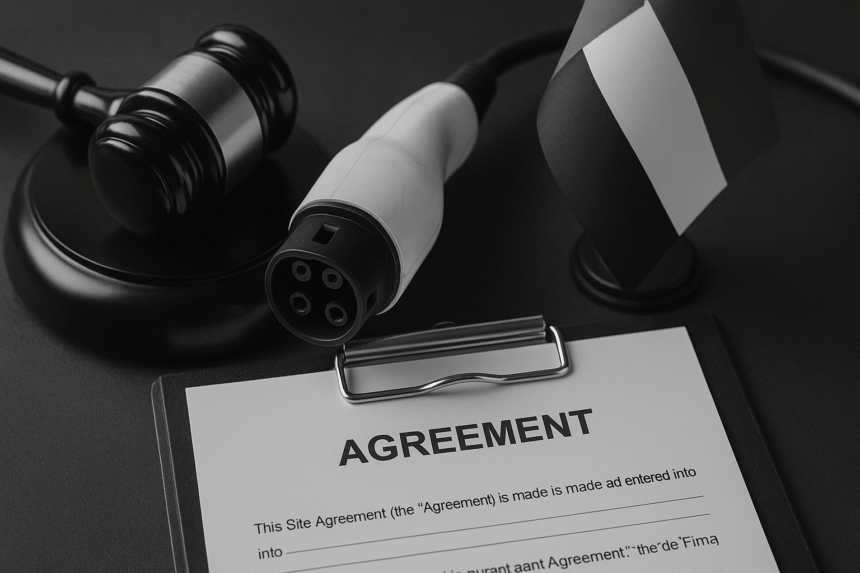How to Draft a Site Agreement for EV Charging Stations in the UAE
As the demand for electric vehicles (EVs) grows across the UAE, more real estate developers, landlords, and EV charging providers are collaborating to install charging stations. But without a solid site agreement, even well-intentioned partnerships can run into disputes, delays, or legal risk.
If you’re planning to host or operate EV chargers on private or commercial property in the UAE, this guide will walk you through how to draft a clear, enforceable site agreement tailored to UAE laws and DEWA requirements.
Who This Is For / When to Use It
This guide is ideal for:
- Landowners and property developers allowing third parties to install chargers on their sites
- CPOs (Charge Point Operators) setting up public or semi-public EV infrastructure
- Facility managers in malls, office parks, and hotels
- Legal advisors drafting agreements for clients in the EV industry
Use this guide when:
- Installing EV chargers at a residential, commercial, or mixed-use development
- Leasing site access to an EV infrastructure provider
- Structuring a revenue-sharing model between a property and operator
Step-by-Step Instructions
Step 1: Define the Parties and the Site
Start by clearly naming both parties:
- The Landowner (or Master Developer)
- The Charge Point Operator (CPO) or EV infrastructure provider
Include:
- Exact property description (address, plot number)
- Site access areas (e.g., parking bays, rooms for equipment)
Tip: Attach a site plan as a schedule to the agreement.
Step 2: Clarify the Scope of Use
Define what the CPO is allowed to do:
- Install, operate, maintain, and upgrade EV chargers
- Access specific parts of the property
- Install signage or branding (if applicable)
Set limits, if needed:
- No retail sales
- No fuel alternatives (e.g., hydrogen or LPG)
Mistake to avoid: Leaving the scope vague. It may lead to overreach.
Step 3: Set the Term and Renewal Options
Define the duration of the agreement:
- Fixed term (e.g., five years)
- Automatic renewal (with or without renegotiation)
Include:
- Termination for breach
- Termination for regulatory changes or site redevelopment
Legal tip: Add a clause requiring X months’ notice before termination.
Step 4: Allocate Responsibilities Clearly
Who does what?
Landowner Responsibilities:
- Provide utility access (power connection)
- Allow 24/7 site access for maintenance
- Coordinate with building management
CPO Responsibilities:
- Install and maintain the chargers
- Handle warranty claims with manufacturers
- Ensure DEWA compliance and licensing
Step 5: Address Power Supply and Metering
Power setup is a major issue in EV site agreements.
Key questions:
- Who pays the electricity bill?
- Is there a dedicated meter for chargers?
- Will there be sub-metering?
Best practice:
- Use a DEWA-compliant smart meter
- Specify who gets invoiced and how usage is reported
Step 6: Set Financial Terms and Revenue Sharing
If the CPO charges EV users directly:
- Will revenue be shared with the landlord?
- Will rent or license fees be paid?
- Are Stripe, DEWA, or VAT fees deducted before sharing?
Examples:
- AED 1,000/month license fee + 10% of revenue over AED 5,000
- Profit split after utility and platform fees
Clarity is key. Attach a revenue-sharing formula or financial schedule.
Step 7: Include Legal Protections
Important clauses to include:
- Indemnity: Each party protects the other from third-party claims
- Insurance: CPO must have public liability and equipment insurance
- Force Majeure: Covers delays due to acts of God, government rules, etc.
- Dispute Resolution: Choose UAE courts (not arbitration unless agreed)
Governing Law: UAE law. Be specific (e.g., Dubai law for sites in Dubai).
Mini Case Study: Avoiding Conflict Through Clarity
A shopping mall in Abu Dhabi signed a basic access letter with a charging provider. After installation, disputes arose:
- Who should fix cable damage?
- Was the landlord entitled to a share of usage fees?
- What if the site was redeveloped?
The absence of a formal agreement led to months of back-and-forth. Eventually, both sides signed a new detailed site agreement with revenue terms, maintenance protocols, and a termination clause for redevelopment.
Lesson: Always formalize the relationship—even for “free” installations.
Checklist: Key Clauses in an EV Site Agreement (UAE)
Closing Thoughts + Call-to-Action
A clear, well-structured site agreement isn’t just a formality—it’s a critical tool for preventing disputes and ensuring sustainable collaboration between landlords and EV operators.
If you’re drafting, reviewing, or negotiating a site agreement in the UAE, get legal advice early. Want a customizable UAE EV site agreement template? Book a consultation and we’ll help tailor one for your project.



Leave a Reply